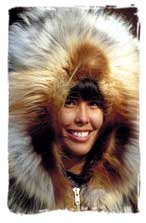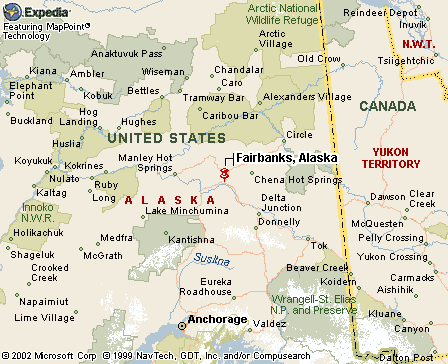|
|
Canku Ota |
|
|
(Many Paths) |
||
|
An Online Newsletter Celebrating Native America |
||
|
July 31, 2004 - Issue 118 |
||
|
|
||
|
Fur, Cloth, Skin and Family Ties go into Native Regalia |
||
|
by Mary Beth Smetzer Fairbanks Daily News Miner |
||
|
Familial ties were evident in the beautiful display of skin, fur and cloth clothing proudly exhibited in the Native Regalia Contest Friday afternoon at the World Eskimo-Indian Olympics. Family threadlines ran throughout each model's outfit from the handiwork of a 93-year-old great-great-grandmother who fashioned fancy boots for her 18-month-old grandson, to many grandmothers who sewed skins or painstakingly pieced black and white calfskin into geometric trim for parkas and mukluks. Contributions by mothers and aunties ran the gamut from intricate skinwork hats, gloves and parkies to beaded fur moccasins, fancy dresses and baby belts. Sisters also got into the act, creating beadwork on moosehide for parka trim and dance slippers, helping out sisters and other young seamstresses just learning the basics of design and embellishment from their relatives. "The Olympics are all about traditions, and it is an exciting thing is to see the younger women picking up the talents from the elders," said Miranda Wright, a longtime judge of the event. "It gives them a lot of pride to wear those traditional outfits." The men, as the hunters also are crucial to outfitting the family. They bring home not only the meat for sustenance but the hides and furs of the animals they hunt. Parkas, hats, mittens, boots and moccasins were made from many combinations of hides and fur such as caribou, moose, marten, beaver, seal, bearded seal, rabbit, wolverine, silver fox, muskrat, wolf and squirrel. For example, 5-year-old Michelle Pearl Kaleak of Barrow wore wolf mittens trimmed with beaver, a black and white rabbit hat, a black rabbit-skin parka with a wolverine and wolf sunshine ruff, and boots with dried sealskin soles trimmed with beaver. Whale baleen was even incorporated into the elaborate outfit of little Jonathan Charles Fritch of Barrow in the form of sunglasses to cut the glare of sun on snow. While designing and making her two-piece moosehide dress, Miss WEIO 2003 Erica Cleaver incorporated beadwork patterns handed down from her grandmother, the late Eleanor Cleaver, who taught her how to sew. Vernetta Nay Moberly of Kotzebue wore a muskrat parka with multiple wolverine fringes worthy of museum display that featured a black and white calfskin diamond trim design, her grandmother's trademark design. A similar design was incorporated into the trim of her caribou mukluks made by another relative. Winners in the three divisions of Friday's Native Regalia Contest were: Hide--first place La'Ona DeWilde; second place Caroline Demientieff, and third place Rebecca Cleary; Fur--first place Joshua Stone; second place Kimberly Stone and third place, a tie between Michelle Brower and Vernetta Nay Moberly; Cloth--first place Ashlyn Santiago Brower; second place Isiah Frankson, and third place Tyler Easton Leavitt-Alred. Winners of Wednesday's Native Baby Contest were: Skin Fur & Cloth are: Indian Furs--first place Kevin Cadzow; second place Tallyah Marie Grace Butler, and third place Madeline Hardy. Eskimo Furs--first place Jan Nashookpuk; second place Joshua Ray Mathew Stone, and third place Tyler Easton Leavitt-Alred. |
|
|
www.expedia.com |
|
|
||
|
|
||
| Canku Ota is a free Newsletter celebrating Native America, its traditions and accomplishments . We do not provide subscriber or visitor names to anyone. Some articles presented in Canku Ota may contain copyright material. We have received appropriate permissions for republishing any articles. Material appearing here is distributed without profit or monetary gain to those who have expressed an interest. This is in accordance with Title 17 U.S.C. Section 107. | ||
|
Canku Ota is a copyright © 2000, 2001, 2002, 2003, 2004 of Vicki Barry and Paul Barry. |
||
 |
 |
|
|
The "Canku Ota - A Newsletter Celebrating Native America" web site and its design is the |
||
|
Copyright © 1999, 2000, 2001, 2002, 2003, 2004 of Paul C. Barry. |
||
|
All Rights Reserved. |
||
 It's
not just DNA that defines family.
It's
not just DNA that defines family.